Some links on this page are affiliate links. This means we may earn a commission at no additional cost to you if you click through and make a purchase, you can check our Affiliate Disclosure. Thank you for your support!
If you’re always on the lookout for easy, delicious treats that don’t require firing up the oven, this South African Marie Biscuit Fudge recipe is bound to captivate your taste buds. Combining the crunch of Marie biscuits with the velvety smoothness of chocolate fudge, this no-bake dessert is not just tasty but also steeped in cultural tradition. Let’s dive into its origins, its cultural significance, and of course, the step-by-step guide to making this delightful sweet treat.
Why You Will Love It
This Marie Biscuit Fudge is more than just a dessert. It’s a journey through history and culture, wrapped in the creamy textures and sweet flavors that resonate with anyone who has a bit of a sweet tooth. It’s quick to make, requires no baking, and can be customized with nuts, dried fruits, or a sprinkle of sea salt for an extra touch of sophistication.
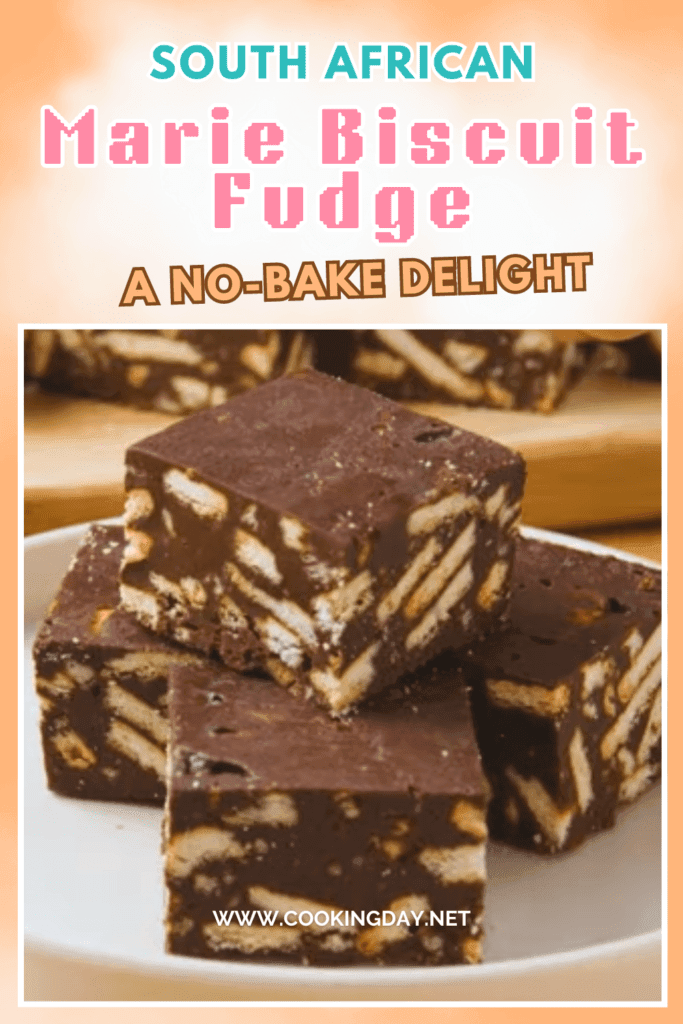
The Sweet History of Marie Biscuit Fudge
Marie Biscuit Fudge, often called Chocolate Biscuit Cake or Cold Cake in different parts of the world, has a rich history. The Marie biscuit has been a staple in many households since the late 19th century, named after the Grand Duchess Maria Alexandrovna of Russia. It became popular as a tea-time snack in various parts of the British Empire, adapting into numerous local variations of desserts.
In South Africa, this fudge became a beloved treat, its simplicity and affordability making it popular among families and especially delightful for festive occasions and holidays. It’s a dessert that evokes nostalgia, often passed down through generations.

Cultural Significance and Variations
In every culture that this dessert touches, it adapts to local tastes and ingredients. In South Africa, the addition of local cocoa and the unique texture of homemade icing sugar give it a distinctive flavor that sets it apart from similar desserts in other countries. Whether it’s called a smudge, munchie, or fudge, each name reflects a local twist and personal touch.
ALSO READ: Super Luscious Vanilla Milkshakes with a Sprinkle Twist
Health Benefits
While this dessert is undeniably a treat, it has a few benefits making it a worthwhile indulgence. First, using pasteurized eggs eliminates the risks associated with raw eggs, making it safer to enjoy. Cocoa powder, a key ingredient, is rich in antioxidants and can improve heart health and brain function. Moderation is key, as this is still a dessert rich in sugars and fats.
Ingredients
- 200g Marie Biscuits, crushed
- 250g butter
- 500g icing sugar
- 120g cocoa powder
- 1 pasteurized egg
- 1 tsp vanilla extract
How to Make Marie Biscuit Fudge
Preparation:
Gather all your ingredients. This recipe is as much about the process as it is about the simple ingredients. Start by lining a square baking dish with parchment paper and greasing it slightly to facilitate easy removal of the fudge.
Mix the dry ingredients:
In a large pot, melt the butter over medium heat. Add the icing sugar and cocoa powder, stirring continuously. The mixture will be thick and glossy. Remove the pot from the heat once fully combined.
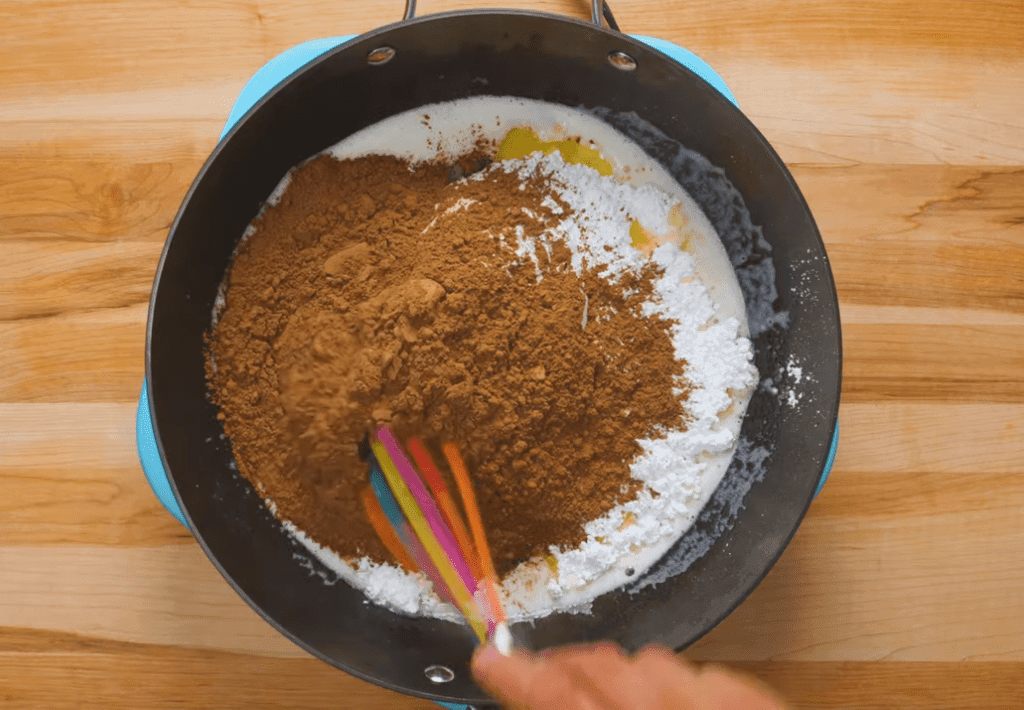
Combine the wet ingredients:
In a separate bowl, whisk the pasteurized egg with the vanilla extract. This step is crucial as it avoids cooking the egg while ensuring it’s safely incorporated into the dessert.
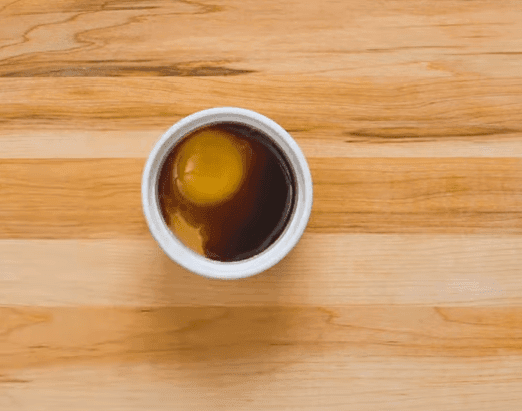
Mixing it all together:
Pour the egg and vanilla mixture into the chocolate mixture. Stir vigorously until the mixture becomes smooth and velvety. Now, fold in the crushed Marie Biscuits until they are completely coated with the chocolate.
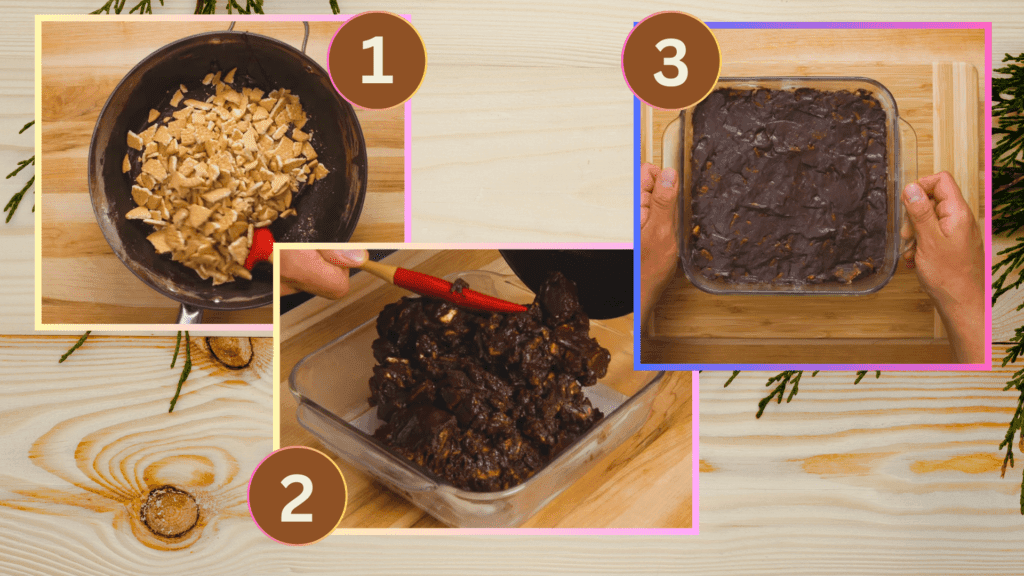
Setting the South African Marie Biscuit Fudge
Transfer the mixture to the prepared baking dish. Smooth the top with a spatula or the back of a spoon. Chill in the refrigerator for at least one hour or until the fudge is firm and set.
Serving:
Once set, use a palette knife to loosen the edges of the fudge from the baking dish. Turn it over onto a cutting board and gently remove the parchment paper. Cut into squares and serve.
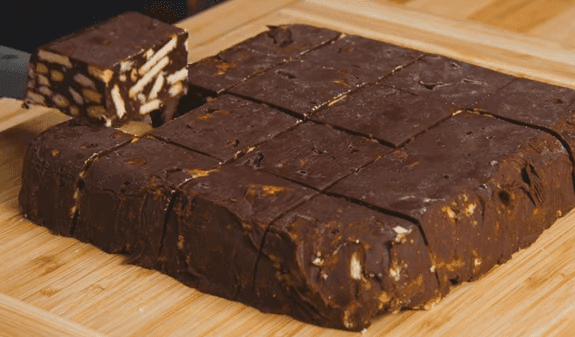
ALSO READ: How to Make Yummy Bobotie: Mastering South Africa’s Beloved Spiced Meat Dish
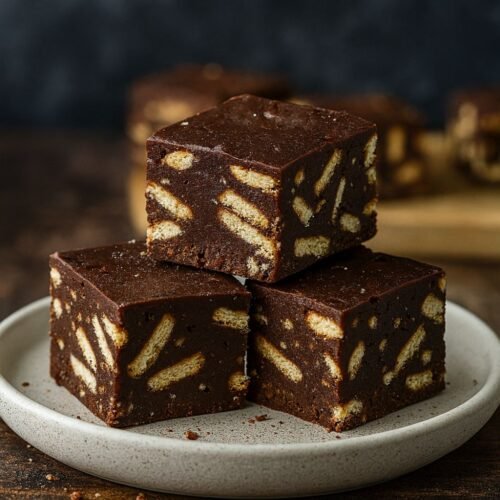
South African Marie Biscuit Fudge: A No-Bake Delight
Equipment
- Large pot
- Whisk
- Square baking dish
- Spatula
- Knife for cutting
Ingredients
- Marie Biscuits: 200g crushed
- Butter: 250g
- Icing Sugar: 500g
- Cocoa Powder: 120g
- Pasteurized Egg: 1
- Vanilla Extract: 1 tsp
Instructions
- Preparation:Gather all ingredients.Line a square baking dish with parchment paper and grease it lightly to ensure easy removal.
- Mix the dry ingredients:In a large pot, melt 250g butter over medium heat.Add 500g icing sugar and 120g cocoa powder to the melted butter.Stir continuously until the mixture becomes thick and glossy, then remove from heat.
- Combine the wet ingredients:In a separate bowl, whisk 1 pasteurized egg with 1 tsp of vanilla extract.
- Incorporate wet and dry ingredients:Slowly pour the egg mixture into the chocolate mixture, stirring vigorously to combine until smooth.Fold in 200g crushed Marie Biscuits, ensuring they are fully coated.
- Set the fudge:Transfer the mixture into the prepared baking dish and smooth the top with a spatula.Chill in the refrigerator for at least 1 hour or until the fudge is firm and set.
- Serve:Once set, cut the fudge into squares and serve.
Notes
- Customization: Add nuts, dried fruit, or a sprinkle of sea salt for an extra flavor twist.
- Storage: Store the fudge in an airtight container in the fridge for up to a week.
- Substitutes: You can replace Marie biscuits with any other tea biscuits or digestive cookies.

Whether you’re a seasoned baker or a newcomer to the kitchen, this South African Marie Biscuit Fudge is a straightforward and rewarding dessert to try. Its rich history, cultural significance, and delicious taste make it an excellent choice for any occasion. So why not give it a try? Delve into the simplicity and joy of making this no-bake fudge and share a slice of South African tradition at your next gathering. Enjoy your culinary adventure!

